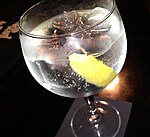Tom and Jerry (drink)
| Cocktail | |
|---|---|
 A Tom & Jerry cocktail | |
| Type | Cocktail |
| Served | Hot in a mug or bowl |
| Standard drinkware | |
| Commonly used ingredients | Eggs or egg whites, powdered sugar, brandy, rum |
| Preparation | Separate eggs. Beat egg whites until stiff. Mix egg yolks with powdered sugar. Put a spoonful of yolk mixture in cup, and mix with brandy and rum. Fold in some egg white, then add hot milk and top with more egg white. Stir gently to fold in the egg white. Top with Nutmeg. |
A Tom and Jerry is a traditional Christmas-time cocktail in the United States, sometimes attributed to British writer and professional boxing journalist Pierce Egan[1] in the 1820s. It is a variant of eggnog with brandy and rum added and served hot, usually in a mug or a bowl.
Another method uses egg whites, beaten stiff, with the yolks and sugar folded back in, and optionally vanilla extract added. A few spoonfuls are added to a mug, then hot milk and rum are added, and it is topped with nutmeg. Pre-made Tom and Jerry batter, typically produced by manufacturers in Wisconsin, Minnesota, the Dakotas, and Montana, is sold in regional supermarkets during the Christmas season.[2][3][4][5]
Name
[edit]The drink's name is a reference to Egan's book, Life in London, or The Day and Night Scenes of Jerry Hawthorn Esq. and his Elegant Friend Corinthian Tom (1821), and the subsequent stage play Tom and Jerry, or Life in London (also 1821). To publicize the book and the play, Egan introduced a variation of eggnog by adding 1⁄2 US fluid ounce (15 ml) of brandy,[dubious – discuss] calling it a "Tom and Jerry". The additional fortification helped popularize the drink.[6][unreliable source]
In popular culture
[edit]Tom and Jerry was a favorite of President Warren G. Harding, who served it at an annual Christmas party for his closest friends.[7]
Two later cartoon duos, a short-lived Tom and Jerry from Van Beuren Studios in the 1930s, and the famous cat and mouse rivalry from the 1940s through the 1960s, also bore the name, possibly as a play on words with the drink or the literary works that inspired it.[8]
The Tom and Jerry serves as the main device in the story "I Yust Go Nuts at Christmas" by Yogi Yorgesson, in which Yogi drinks a dozen rounds of the beverage and is thus hung over for the following day's Christmas dinner.
See also
[edit]References
[edit]- ^ https://cooking.nytimes.com/recipes/1014400-tom-and-jerry "It...is frequently (though not definitively) credited to Pierce Egan, the English chronicler of sports and popular culture." Egan was the author of the 1821 novel Life in London; or, the Day and Night Scenes of Jerry Hawthorn, Esq., and his elegant friend, Corinthian Tom, on which the stage play of the same year Tom and Jerry, or Life in London was based
- ^ Faust, Eric, Tom and Jerry batter is seasonally available in the Jamestown, New York, area, where a strong Swedish influence is prominent. "Connolly's Tom and Jerry Batter from Superior, WI," Heavy Table, 2009; See also Mrs. Bowen's Tom and Jerry Mix.
- ^ One example of the Batter mix is produced by Flaherty's Happy Tyme Company (P.O. Box 11472 - Mpls./St. Paul, MN 55111).
Its listed ingredients include: Eggs, Sugar, Vegetable Stabilizer, Cream of Tartar and Vanilla. {14 oz. tub: Bar code: 0-27356-12345-0} - ^ Tom and Jerrys are so popular in Milwaukee, Wisconsin, that Bryant's Cocktail Lounge maintains a dedicated Tom and Jerry room in December, in which the only possible order is a Tom and Jerry.
- ^ "Montana Made: City Bar's Tom and Jerrys". KPAX News. 2018-12-25. Retrieved 2023-11-26.
- ^ Block, Stephen. "The History of Egg Nog". Food History. The Kitchen Project. Archived from the original on 2011-05-10. Retrieved 2006-12-16.
- ^ Russell, Francis (1968). The Shadow of Blooming Grove: Warren G. Harding In His Times. Easton Press. p. 141. ISBN 0-07-054338-0.
- ^ McMahon, Seán; O'Donoghue, Jo (2004). Brewer's Dictionary of Irish Phrase & Fable. London: Weidenfeld & Nicolson. p. 799. ISBN 978-0-304-36334-6.
External links
[edit] Media related to Tom and Jerry (drink) at Wikimedia Commons
Media related to Tom and Jerry (drink) at Wikimedia Commons


